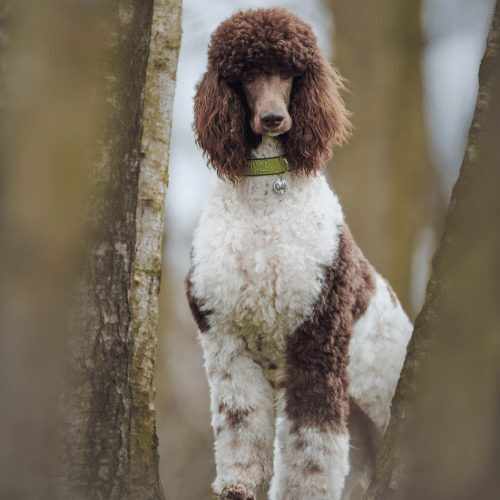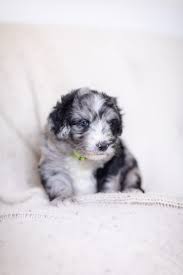Introduction
Phantom Merle Poodle are striking, though relatively rare variation of the Poodle breed. They are unique in coat patterns and charming personalities. This combination of the merle pattern and “phantom” color markings on these dogs is, at once, beautiful to behold and makes great companions. This comprehensive guide provides all the necessary information related to Phantom Merle Poodles, from their characteristics to genetics, health concerns, grooming requirements, and FAQs.

Knowing the Poodle Breed
Overview of Poodle
Poodles exist in three sizes: standard, miniature, and toy. All three sizes are similar in many ways, including intelligence, versatility, and a hypoallergenic coat. Poodles have athletic ability paired with grace, making them fine contenders in several dog sports and activities.
Temperament
Whatever the size of a Poodle, they are always friendly and intelligent, always eager to please, hence very trainable. Social and adaptable in nature, they do well in families, single owner dwellings, and even with seniors. Early socialization is critical to ensure that they grow to become proper adults.
Physical Characteristics
The Phantom Merle Poodle features a ground coat color that is a solid shade combined with merle patterns. Phantom markings usually result in a subordinate color appearing in specific places on the face, legs, and belly. The Merle pattern adds a mottled effect and will be shades of gray, blue, or brown with black patches.
The Merle Gene
What is the Merle Pattern?
This mottled or swirled appearance to a dog’s coat comes about due to a certain kind of mutation and is thus what characterizes the merle pattern. In the case of the Phantom Merle Poodle, this pattern harmonizes perfectly with phantom marks to produce a really great visual effect.
Genetics of the Merle Pattern
The merle gene is not native to Poodles and is transferred by crossbreeding with other merle-patterned breeds, such as Australian Shepherds. If a Poodle inherits the merle gene, they sport the mottled pattern. However, if two merle dogs are bred together, the likelihood of the resulting offspring being “double merle” raises a number of problems.
Cautious Breeding
To avoid health defects, quality breeders do not breed two merle Poodles together. Instead, they breed a merle Poodle to another non-merle Poodle, thereby encouraging overall health and energy in the puppies while still aiming for the desired coat colors. The potential owners are supposed to seek these breeders who test and screen their breeding stock about overall health and genetics.
Phantom Merle Poodle Health Issues
Common Problems in Poodles
Like all Poodles, Phantom Merle Poodles are also prone to these diseases, among them being:
- Hip Dysplasia: It is one of the genetic diseases causing the joint defect in the hip that leads to arthritis.
- Patellar Luxation: It is the condition caused when the kneecap dislocates from the groove found in the thigh bone. This leads to pain and discomfort while it dislocates, resulting in lameness.
- Progressive Retinal Atrophy (PRA): It represents a degenerative disease of the retina, with potentially complete, irreversible loss of vision.
- Epilepsy: A neurological problem that can be seen as a seizure.

Specific Health Issues Associated with the Merle Gene
Irresponsible breeding of Merle Poodles is likely to lead to a number of health-related issues, including;
- Deafness: Many double merle dogs come deaf or may be rendered partially or totally deaf at later ages in their life.
- Vision Disorder: Cataracts or retinal disease may be more common among double merle puppies.
- Other Genetic Diseases: Barring breeding lines, a Merle Poodle may be at a higher risk for many genetic diseases.
Veterinary Care
A Phantom Merle Poodle needs to visit the veterinarian on a regular basis to remain healthy and to check up on their condition. Important elements of a long life should include vaccinations, control of parasites, and proper dental care. Early detection most often includes a better prognosis with any of these conditions.
Needs to Groom Phantom Merle Poodles
Coat Care
Phantom Merle Poodles have a dense, curly coat which should be groomed regularly for its health and prevention of matting. Grooming needs consist of:
Brushing: Brush your Poodle at least two to three times a week to remove loose hair and prevent tangles. A slicker brush or comb is very effective for their curly coats.
- Professional Grooming: Do professional grooming every 4 to 6 weeks to help maintain the health and cleanliness of the coat. Several designs and certain trims can be done to your puppy according to the look you want for your dog through professional groomers.
Bathing: Bathe your Poodle occasionally, ensuring to use some soft shampoo designed for dogs to maintain the freshness of the coat. Ear Care
Poodles are prone to getting ear infections, so their ears should be checked regularly and cleaned periodically. You may use a veterinarian-recommended ear cleaner. Their ears need to be clean and dry after each bathing.
Dental Care
Dental care is crucial for the well-being of your Poodle. Brush your dog’s teeth three to four times a week using dog-specific toothpaste. You can provide dental chew or other toys, which are designed to keep his teeth in pristine condition.
Nutrition for Phantom Merle Poodles
Balanced Diet
Keep your Phantom Merle Poodle healthy with a balanced diet. Your Phantom Merle Poodle needs to have a suitable quality food, according to its size and age. It is best to choose options that contain high-quality protein, good fats, and necessary nutrients.
Portion Control
Poodles are prone to obesity, so proper food consumption must be implemented. Follow the feeding guidelines given on the dog food pack and consult with your vet according to the needs of your dog.
Fresh Water
Fresh, clean water should always be available for your Poodle. Being hydrated is important for overall well-being, especially during hot seasons or after playing.
Exercise Needs
Day to Day Exercise
Phantoms Merle Poodles are working dogs and, thus, need a proper and adequate physical exercise. The dog requires at least half an hour to up to one hour daily exercise. This could be taken in the form of walks, games with the pet, and interactivities.
Mental Stimulation
Mental stimulation apart from physical exercise is also important for Poodles. Encourage the dog by puzzle toys, training sessions, and interactive games. The boredom will be kept under control along with any behavioral disorder that accompanied boredom.
Training and Socialization
Importance of Early Training
Early training and socialization play a vital role in raising an uplifted balanced Phantom Merle Poodle. Train your puppy from the very first day when you bring the puppy home. Reward dog behavior is the best, as Poodles love learning and pleasing you.
Socialization
Socialize your puppy by exposing it to various surroundings, people, and other animals so that it becomes an excellent socializer. Socialization early in life will prevent any future fearfulness and anxiety. Puppy classes can also be an excellent socialization experience.
Obedience Training
You need to put your puppy into obedience classes for him or her to learn some basic commands, good manners, and further bond with you, ensuring flexibility and conformity of behavior.
Lifespan and Longevity
Phantom Merle Poodles generally live a life that is the same as other Poodles, averaging 12 to 15 years. Proper veterinary care, a balanced diet, and an energetic lifestyle all add up to a long and happy life.
Common Misconceptions of Merle Poodles
Myth 1: All Merle Poodles Are Sickly
Although the merle carries great risks, it is not a guarantee that every merle Poodle will develop health issues. Inconsiderate breeding practices can greatly reduce the risks involved with the merle gene. A significant aspect of choosing the right breeder will be the significant health screenings they undertake.
Myth 2: Merle Poodles Are Rare and Expensive
Although Phantom Merle Poodles are less common than other colours, prices will vary based on the reputation of the breeder and where you live. They aren’t necessarily prohibitively expensive, either.
Myth 3: Merle Poodles Are Different
There is no indication that the color or pattern in a Poodle’s coat has anything to do with its temperament. Phantom Merle Poodles are just like any other-friendly, super smart, etc.
Frequently Asked Questions (FAQs)
1. What is a Phantom Merle Poodle?
A Phantom Merle Poodle is a Poodle with a unique coat pattern that’s defined by the combination of phantom markings with a merle pattern, resulting in aesthetically impressive effects mixing areas of specific solid colors with the mottling of the merle.
2. Are Phantom Merle Poodles healthy?
Like any Poodle, Phantom Merle Poodles are prone to particular conditions. A merle gene in and of itself carries a degree of risk but only if irresponsible breeding occurs. Irresponsible breeding and regular veterinary care can help mitigate this risk.
3. How much does a Phantom Merle Poodle cost?
The price of Phantom Merle Poodles can vary widely based on factors such as breeder reputation, geographic location, and demand. Prices can range from $1,500 to over $3,000.
4. How do I choose a reputable breeder?
Look for a breeder who is a registered member of a respectable organization, such as the American Kennel Club (AKC). Ask if they have health tested and genetically screened their breeding stock. A visit to the facility of the breeder will also speak to the caliber of the breeder.
5. How much grooming does a Phantom Merle Poodle require?
Phantom Merle Poodles require regular grooming to maintain the health of their coats. Brush them two to three times a week and bring them in for professional grooming every 4 to 6 weeks. Also, ear and dental care should be performed on a regular basis.
6. How much exercise will they require?
Phantom Merle Poodles need at least 30 to 60 minutes of exercise a day. These could be walks, playtime, and some interacting games. MENTAL STIMULATION should also be one of the things you consider to help keep them engaged.
7. Are Phantom Merle Poodles good with kids?
Generally, Phantom Merle Poodles are well-behaved around children. They are friendly and extremely social, which is an ideal family pet.
Early socialization and training, of course, will really polish their interaction with the little rascals surrounding.
8. Do they have special dietary needs?
Phantom Merle Poodles don’t require special diets. However, it’s a must to feed your Phantom Merle Poodle a balanced diet according to size and age. Your veterinarian can provide you with the ideal type of food to feed them.
9. How long do Phantom Merle Poodles live?
Phantom Merle Poodles live for approximately 12 to 15 years, as do other Poodles. Good veterinary care and a healthy lifestyle are good predictors of longevity.
10. Is a Phantom Merle Poodle easy to train?
Yes, Phantom Merle Poodles are intelligent and eager to please, making the breed very easy to train. Positive reinforcement is very useful, and early training and socialization are helpful in developing good behavior.
Conclusion
Phantom Merle Poodles do look very impressive, but they also have a superb personality that would make them great companions. Their characteristics, the need for special care, and any health problems they may have are things the prospective owners should know about, so they can give their new furball all the loving support it needs.
Provided you groom, train, and care for them with a veterinarian, the Phantom Merle Poodles can be wonderful family pets for many years. Their special appearance and gentle nature make them very special to any member of the family. If you are thinking of bringing one to your family or just admire how these dogs look, the Phantom Merle Poodle is a breed that must be known.

